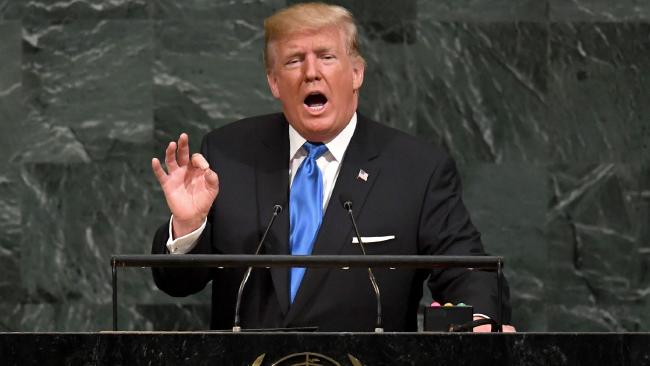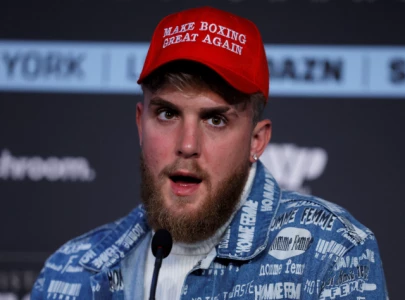
Trump will be wielding the gavel at the top UN body, where the United States this month holds the agenda-setting presidency of the 15-nation council that deals with the world's most pressing security threats.
Trump's appearance in the formal setting of the Security Council chamber could trigger surprises. UN diplomats note that the US president has been known to stray from protocol and procedure.
During his address to the General Assembly on Tuesday, Trump assailed Iran's leaders, accusing them of sowing "chaos, death and destruction" and calling on world governments to isolate Tehran.
Trump criticises Iran as 'corrupt dictatorship' in UN speech
Iranian President Hassan Rouhani shot back in his speech, denouncing leaders who have "xenophobic tendencies resembling a Nazi disposition" and slamming the planned council meeting as a "preposterous and abnormal act."
The meeting will show a rift between the United States and its European allies over the Iran nuclear deal that Trump ditched in May after repeatedly dismissing it as disastrous.
The United States has moved to reimpose sanctions that had been lifted under the landmark deal to curb Iran's nuclear program and has vowed to punish foreign firms that do business with Iran.
On Monday, the five remaining parties to the agreement--Britain, China, France, Germany and Russia--defiantly announced that they would set up a special payment system to continue trade and business ties with Iran.
The United States had initially said the meeting chaired by Trump would focus on Iran, but later broadened the agenda under the theme of nuclear non-proliferation and weapons of mass destruction.
That opens the door to remarks on chemical weapons use in Syria, the drive to denuclearise North Korea and the nerve agent attack in Salisbury, where the United States and the Europeans can show unity.
The usual practice is for the chair to speak last at council meetings, but in this instance Trump will be the first to address the chamber followed by other heads of state.
One of those will be leftist leader Evo Morales of Bolivia, a non-permanent council member critical of US foreign policy and a close supporter of Venezuela.
After the United States imposed sanctions on Venezuela in May, Morales took aim at Trump, saying he "must understand that the world is not his estate."
French President Emmanuel Macron will address the council meeting as will British Prime Minister Theresa May. Russia and China will be represented by their foreign ministers Sergei Lavrov and Wang Yi.
Iran has not requested to speak at the council meeting, diplomats confirmed Tuesday although Rouhani will hold a press conference soon after it is due to end.
Trump: 'no plans' to meet Iran's Rouhani 'despite requests'
It will be only the third time in UN history that a US president will chair a Security Council meeting. Barack Obama presided over two meetings in 2009 and 2014.
Trump is one of around 130 world leaders attending the General Assembly in New York which formally began on Tuesday.
Speakers scheduled to address the second day of the assembly include the leaders of war-torn Yemen and Afghanistan while Prime Minister Theresa May will make her last speech at the world's foremost diplomatic stage before Britain leaves the European Union.
US-EU rift cracks wide open over Iran sanctions
Tensions between the United States and the European Union over Iran soared into the open Tuesday after the Europeans announced plans for a legal framework to preserve business with Tehran and evade new US sanctions.
In rhetorical exchanges that brought back memories of the feud over the 2003 Iraq invasion, the United States denounced the Europeans who in turn made clear they would not back down on diplomacy.
Britain, France and Germany--along with Russia and China--had all pleaded unsuccessfully for President Donald Trump to remain in the six countries' 2015 accord with Iran on ending its nuclear program.
Full US sanctions are set to hit Iran in November and the country's economy is already taking a beating.
After talks Monday with Iranian Foreign Minister Mohammad Javad Zarif, EU foreign policy chief Federica Mogherini said the Europeans would set up a "legal entity" for businesses to transfer money without coming under Washington's scanner.
US Secretary of State Mike Pompeo, addressing a pressure group on the sidelines of annual UN meetings, said he was "disturbed and indeed deeply disappointed" by the EU announcement.
"This is one of the of the most counterproductive measures imaginable for regional and global peace and security," Pompeo said in a speech that was interrupted several times by anti-war protesters.
UN court has no jurisdiction in Iran sanctions case: US
"By sustaining revenues to the regime, you are solidifying Iran's ranking as the number-one state sponsor of terror," said Pompeo, who quipped that Iran's "corrupt ayatollahs" and elite Revolutionary Guards had to be "laughing this morning."
John Bolton, Trump's hawkish national security adviser, mocked the European Union for its lack of detail on the planned mechanism.
"The European Union is strong on rhetoric and weak on follow-through," he told the United Against a Nuclear Iran campaign.
"We do not intend to allow our sanctions to be evaded by Europe or anybody else," he said.
Bolton also issued unsubtle warnings to Iran's leaders: "We are watching, and we will come after you."
"If you cross us, our allies or our partners, if you harm our citizens, if you continue to lie, cheat and deceive, there will be hell to pay."
Bolton has denied that the United States is seeking to overthrow the regime but before taking office had called for efforts to destabilize the country.
The feud came as Trump and Iranian President Hassan Rouhani addressed the United Nations General Assembly, offering diametrically opposed messages.
Rouhani voiced regret that the deal, negotiated under former president Barack Obama, had become a 'toy' of US domestic politics and accused Trump of seeking to overthrow his government.
French President Emmanuel Macron called for continued sales of oil by Iran, saying the flow would lower global prices and also benefit peace efforts.
"What will bring a real solution to the situation in Iran and what has already stabilised it? The law of the strongest? Pressure from only one side? No!" Macron said in his address.
He said the nuclear deal put Western powers in a stronger position to raise other concerns highlighted by Washington including Iran's support of militant groups Hamas and Hezbollah.
The Europeans highlight that UN inspectors have repeatedly found that Iran is in compliance with the 2015 deal, under which it scraps the bulk of its nuclear program in return for sanctions relief.
German Foreign Minister Heiko Maas told reporters there was "strong unity" with Iran on minimising the impact of US sanctions.
Nonetheless, a number of prominent European businesses, including French energy giant Total and German automaker Daimler, have already said they will exit Iran to avoid US sanctions.

















COMMENTS
Comments are moderated and generally will be posted if they are on-topic and not abusive.
For more information, please see our Comments FAQ